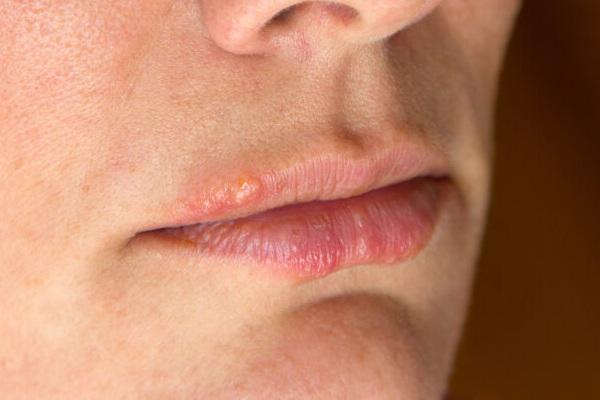Зміст
Those who have had herpes know that it is a chronic illness. For those who have not experienced this before, we advise how to protect themselves from it and, possibly, treat it.
Herpes is an infectious viral disease. It is caused by the herpes simplex virus (HSV – the same one that causes chickenpox, for example), which occurs in two types: HSV1 and HSV2. The first type of virus attacks the mucous membrane of the mouth and lips, and the second – the enemy of the genitals.
How can you get herpes?

Infection can occur in different situations of daily life. HSV spreads easily and quickly through airborne droplets and through direct contact with an infected person. So remember to be careful when dealing with people who have signs of herpes: avoid kissing, drinking from the same glass, using the same cutlery, etc. Also, use only your own toiletries and makeup. Hygiene will reduce the risk of herpes on the lips.
The development of herpes is facilitated by a decrease in the body’s immunity, malnutrition, stress and fatigue, and in women, menstruation. The virus that causes cold sores is activated both in winter, when we freeze, and in summer, when we spend too much time in the sun.
Phases of labial herpes
Tingling phase – in a reddened place where herpes will soon appear, we feel pain, that is, itching, burning or even tingling, which lasts two days.
The follicle phase is the formation of a lump on the reddened area that turns into painful blisters
The release phase – serum or pus oozes from the blooming blisters; then you need to be extremely careful not to spread the infection
The crusting phase – herpes heals slowly and crusts form that should not be touched or scratched, as this prolongs the healing process. During treatment, be careful with the scab so as not to irritate it with a scarf or turtleneck.
Ignoring the disease can cause serious complications, it is better to immediately use a special drug. It is dangerous when it gets into the eyes or the brain (this is very rare). Then dangerous keratitis or meningitis can occur.
How is herpes treated?
The most famous drug is acyclovir. If the symptoms of herpes are very severe, there are numerous ulcers, severe pain, the doctor may prescribe acyclovir tablets or injections.
With a milder course of the disease, local treatment is sufficient – the use of acyclovir ointment. You should always have it at home so that you can use it as soon as the first symptoms appear (itching, tingling, pain). As a result, the treatment will be several days shorter and the blisters will dry out quickly.
To relieve discomfort, you can bathe in water daily with 6–10 drops of geranium, lavender, or tea tree oil. If you don’t have oil, you can try salt water baths. Dissolve half a cup of baking soda in four liters of warm water. Soak the affected skin in this solution several times a day.
Aloe gel has a calming effect – relieves pain and dries. Spread it for cold sores several times a day.
Until the herpes is completely healed, refrain from intercourse.
Wear only cotton underwear. Avoid stretchy pantyhose and tight pants – lack of air and moisture will make healing difficult.
How to prevent recurrence of herpes?

Strengthens the body’s immune system. Echinacea, ginseng or adma extracts (a preparation containing extracts of many plants) are very good preparations for improving the functioning of the immune system.
Take vitamin C and zinc. Take 250 mg of vitamin C and 15 mg of zinc every day for six weeks. Research has shown that these substances protect against frequent herpes attacks. Also eat foods rich in these nutrients. Citrus fruits, kiwi and peppers contain the most vitamin C. Zinc is found in seafood and chicken.
Enrich your diet with foods rich in lysine, an amino acid that inhibits the multiplication and spread of the herpes virus. Most of the lysine is found in milk, soy, beans and meat.
Avoid arginine, an amino acid that in turn makes the virus active. Almonds, nuts, gelatin and chocolate are high in arginine.








